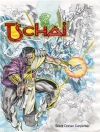Throughout his childhood and adolescence Willie Maddison has always felt himself to be a misfit. He has never known a mother’s love nor felt any affection from a father who blames his son for his wife’s death in child-birth. The outbreak of war in 1914 gives him the chance to escape the suffocating constraints of his home life and he enlists in the army. It is in the trenches that at last he finds comradeship and a sense of purpose and experiences events that will change his life forever.
On Christmas Eve, 1914 a spontaneous truce breaks out along a number of sectors of the front. The guns fall silent and carols can be heard coming from the German trenches. After a time, men from the opposing armies begin to venture forth into No Man’s Land. The opportunity is taken to bury the dead and joint services are held. On Christmas day, celebrations are shared, gifts exchanged and games played. Willie is shocked to learn that the German soldiers also believe God to be on their side and realises that were it up to the ordinary soldier the killing would never start again.
Commissioned, decorated and eventually demobilised, Willie Maddison finds it difficult to adjust to civilian life and, after a disastrous love-affair, retreats to a derelict cottage on the North Devon coast to make a start on the book that has been burning in him since that fateful Christmas Day and which he hopes will help prevent the pointless sacrifice of another generation.
It is not long before his unconventional behaviour and what are judged to be dangerously radical ideas are seen by the ‘local establishment’ as a threat to good order and when he forms an attachment to a daughter of one of the oldest families a campaign is mounted to drive him out.
Yazar hakkında
The landscape of North Devon is dramatic and impressive and has long been the inspiration for painters and poets, writers and dreamers. Charles Kingsley, Turner, R. D. Blackmore, Agatha Christie and more recently Ted Hughes and Henry Williamson to name but a few. Peter Rothwell follows in their illustrious footsteps.
Readers familiar with the novels of Henry Williamson will recognise in the title ‘ANCIENT SUNLIGHT’, a reference and a tribute to his fifteen volume ‘Chronicle of Ancient Sunlight’, which contains, particularly in the four books set during the Great War, some of the best writing in the English language. Williamson, in his title for the ‘Chronicle’, was paying homage to Richard Jefferies, whose autobiography’The Story of My Heart’ had had such a profound effect upon the young soldier home from the trenches
For Peter Rothwell, it was the discovery of Henry Williamson’s ‘Dandelion Days’ when he was fourteen that prompted a deep interest in Williamson’s work, eventually leading to several meetings with the author. One of the topics discussed was the ending of ‘The Pathway’, the final part of Williamson’s tetralogy ‘The Flax of Dream’. Why had he chosen to end the story the way he had? It transpired that he had considered a number of alternatives.
It was at this moment that the idea of writing a ‘post-script’ to ‘The Pathway’ was born and approval sought. “You may write what you wish. You may send me a copy, but I will not promise to read it…” came Williamson’s reply.
‘ANCIENT SUNLIGHT’ is the outcome of that conversation…
Peter Rothwell is well-known for his paintings and illustrations of North Devon and his books about Lundy Island.
‘ANCIENT SUNLIGHT’ is his first novel. and won an award from The Winston Graham Trust.












